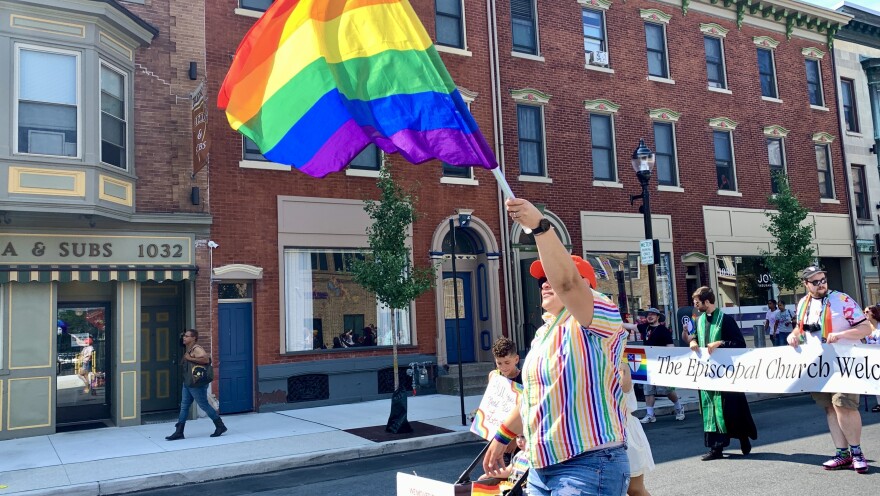ALLENTOWN, Pa. — After months of debate, amendments and rewrites, Lehigh County's proposed wide-reaching non-discrimination bill has been passed.
County commissioners voted 6-3 on Wednesday to approve the bill. It now heads to the county executive for his signature.
It outlaws discrimination in education, employment, health care, housing and public accommodations in all of Lehigh County, establishing a set of protected classes beyond state law.
Complaints made to the county would be adjudicated by a new Human Relations Commission, with fines imposed to be decided by county courts.
The bill is the result of the Lehigh County Human Relations Advisory Council, which was formed in 2021 to address issues of discrimination as it might occur in the county.
After first being introduced by Commissioner Zach Cole-Borghi, a human relations advisory council member, in October, the bill was subject to significant scrutiny and multiple amendments.
That led to dueling rewrites of the bill being introduced in January by Cole-Borghi and Commissioner Jeffrey Dutt. Commissioner Sheila Alvarado joined Cole-Borghi as a co-sponsor to the bill this month.
Dutt's bill set a smaller number of protected classes while ceding some investigation responsibility to the Pennsylvania Human Relations Commission, which acts as the state's civil rights enforcement agency.
Commissioners Geoff Brace, Cole-Borghi, Alvarado, Jon Irons, April Riddick and Dan Hartzell voted yes to Cole-Borghi's rewrite of the bill, while commissioners Dutt, Antonio Pineda and Ron Beitler voted no.
"This is an important bill for me," Irons said. "Discrimination is something that happens frequently in a lot of different capacities in a lot of different ways.
"And I think it's important to have a venue for accountability when it comes to you know, when folks experience discrimination, especially in issues around housing, and employment.
"I think [the human rights commission] will be a vital body to ensure that the rights and dignities of our residents are being protected."
Hartzell, despite his yes vote, said he is concerned there is the potential for abuse of the bill.
"I think of the worst that could happen would be a tremendous flurry of filings and the administration being overwhelmed and legal being overwhelmed, and all that kind of thing," Hartzell said.
"Normally, I wouldn't think this is a good way to legislate, which is to say, 'Well, if there are terrible problems that arise from this legislation, we'll go back and fix it then, or even withdraw it.' But in this particular case, I think that is a reasonable approach.
"The proponents say that there aren't a lot of false complaints. Let's find out. Let's see. And because I think of the good that can come with this, you have to balance with the potential problems."
Pineda and Beitler said they support the goals of ending discrimination in the county, but voiced concern related to the power vested in the appointed Human Relations Commission.
Former Commissioner Dean Browning joined in on that concern, also noting a lack of provisions on whether legal services would be provided.
Brace countered that concern, saying the board regularly appoints and denies appointments to commissions with "significant and real impact on the quality of life in Lehigh County."
He said that if the legislation was not living up to expectations, he would be very happy to bring an action forward to change or disband it as needed.

Newly protected groups of people
The bill's new protected classes include actual or perceived race, ethnicity, color, religion, creed, national origin or citizenship status, ancestry, sex (including pregnancy, childbirth and related medical conditions), gender identity, gender expression, sexual orientation, genetic information, marital status and familial status.
It also covers discrimination related to GED rather than high school diploma, physical or mental disability, relationship or association with a disabled person, source of income, age, height, weight, veteran status, use of guide or support animals and/or mechanical aids, or domestic or sexual violence victim status.
In past meetings, Dutt said some categories could be difficult to enforce, and said an earlier version of the bill "goes too far."
He said the opposing bill was an attempt at a "bipartisan coming together."
"Based on my research, I think it's the most inclusive non discrimination ordinance in Pennsylvania and possibly in the United States. And it's not because it has anything overreaching in it. It's because the ordinance combines the best parts of municipal Pennsylvania non discrimination language from ordinances and other municipalities all into one law."Activist Liz Bradbury
Dutt's opposing bill was withdrawn during Wednesday's meeting.
An amendment proposed by Brace ensuring due process and confidentiality with complaints was withdrawn after he said it was redundant upon further review of local, state and federal law.
Liz Bradbury, vice chairwoman of the Human Rights Council and longtime regional activist who also helped pass and formulate non-discrimination ordinances in Reading, Easton and State College, praised council for the bill's passage.
"I just want to say about the passage of the non-discrimination ordinance that I'm very proud to have been the architect of it and to have worked with such a brilliant group of diverse people on the Lehigh County Human Relations Advisory Council for two and a half years to craft it," Bradbury said.
"I'm proud to live in a county where the Board of Commissioners would take this bold step to pass it.
"Based on my research, I think it's the most inclusive non-discrimination ordinance in Pennsylvania and possibly in the United States.
"And it's not because it has anything overreaching in it. It's because the ordinance combines the best parts of municipal Pennsylvania non discrimination language from ordinances and other municipalities all into one law.
"I hope other counties like Northampton, Berks and Bucks, use this ordinance language to pass their own."
Commissioners thanked Bradbury for being a resource.

Joe Welsh of the Lehigh Valley Justice Institute also praised the legislation, saying it was "such an important step forward" and that it was "something that doesn't have to wait for Harrisburg to act, doesn't have to wait for Washington to act."
Joins other state municipalities
Pennsylvania laws prohibit discrimination based on race, color, religious creed, ancestry, age (40 and over), sex, national origin, familial status (only in housing), handicap or disability and the use, handling, or training of support or guide animals for disability.
Discrimination on the basis of sexual orientation and gender identity is not explicitly banned in the state, but Gov. Josh Shapiro has called to expand non-discrimination laws to protect LGBTQ+ Pennsylvanians statewide.
No law has yet made it to the governor's desk.
In response to the limited statewide coverage, many municipalities and counties have moved to enact their own non-discrimination legislation explicitly codifying LGBTQ+ and other protections.
Many communities in the Lehigh Valley have their own similar legislation, including Allentown, Bethlehem, and Easton.
Allentown first passed its anti-discrimination ordinance in the 1960s based on age, race and sex in employment, housing and use of public facilities, and was updated to include sexual orientation and gender identity in 2002 after a significant push by activists.
The new legislation in Lehigh County has a provision for the cities of Allentown and Bethlehem to choose to opt in or out of the expanded county protections given their existing laws.
Local laws offer protection to about a third of Pennsylvania’s population in access to housing, employment and public accommodations, according to the state attorney general office.


